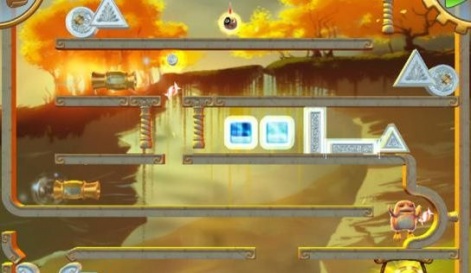Now a portion of that expertise is being devoted to iOS, with the latest title, Furmins, due out in January 2012.
What were the reasons behind Housemarque's shift into mobile? How will it approach the platform differently?
Producer Sami Koistinen, gave us the low-down on the project.
PocketGamer: Housemarque has been around since 1995 but Furmins will be your first iOS game. Why have you decided to make the jump?
Sami Koistinen: The decision was quite easy, actually. We had been working on the prototype of Furmins for quite awhile and suddenly Apple announced that it has this mighty new device called iPad.
We tried it out and instantly realised that its large touchscreen is perfect for games like Furmins. It's quick, easy and accurate to move items around the game level and you don't need two finger zoom to see everything clearly at once.

iOS had also proven to be a viable platform to support healthy game sales, so we took the plunge into the mysterious world of iOS games.
How much of your development team have you devoted to Furmins?
During this year - at the time of writing this and according to our bookkeeping - Furmins team has spent 8,441 hours working on this game.
There's still some work to be done and of course the updates will require lots of work also. So quite a few people have been working on this game.
Some of the team members are working full time on this project and some of them are 'visiting guest stars'. But all in all the final credits list is quite long. If you translate all the above information into 'theoretical full time team members', it's a bit over five team members working full-time on this game.
It seems that the quality of the iOS games is gradually going up. This means that it takes longer and longer to create the games and the development teams also need to be larger.
It'll be interesting to see if this trend sticks or not. I guess it all boils down to supply versus demand: if the people keep buying higher end games in high volumes, then the supply will always be there.
What are the benefits of developing titles on iOS?
The most obvious benefit of developing for iOS is that you don't need multimillion dollar budgets to get your game published.
In fact most of the iOS games out there are self published by really small new game companies. The platform gives you a chance to be responsible for the whole game from its inception to publishing. If you keep the project small enough, you can do what you want without needing outside assistance.
For us the iOS is one viable platform among the others. You need to consider it while deciding on which platforms you want to support with your upcoming game.

We try to keep an open mind and a keen eye on all the platforms out there. If the game concept works great on some of them, then they'll most likely end up on our support list.
What pricing model are you considering? Will you support IAP?
Our initial launch consists of two versions of the game. The $2.99 version is a universal build and supports all latest iOS devices. The $0.99 version is exactly the same game, but support only the smaller screen iOS devices.
IAP are supported and are a central part of the game.
By playing through game levels you gain in-game currency. You use this currency to unlock new game worlds, bonus levels and wallpapers. You can use IAP to gain more in-game currency if you managed to spent all of it.
Do you agree that developing for iOS means providing a service rather than a game?
This is definitely true. The iOS gamers expect new game levels and features to be made available for them after the purchase of the game.
In practice this means that you have to dedicate some team members to work almost full time on the game even after its launch. This is also a good thing, since you don't need to come up with a new game concept to work on every few months.
You can keep developing further the game you already released and make it even bigger and better. In a way it's like gardening: you plant a seed and keep taking care of that plant and one day it'll grow in to this huge big tree. In game terms this means extra game levels for the players.
Thanks to Sami for his time. You can find out more about Housemarque here.





















